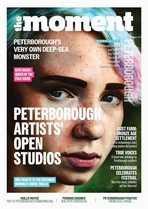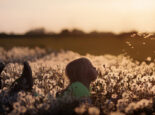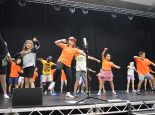Hearing Peterborough’s True Voices

True Voices is a brand-new anthology of short fiction, non-fiction and poetry by Peterborough residents – put together and created entirely by students from University Centre Peterborough. We spoke to the creative lead on the book, and English Literature course leader, Andrew McDonnell, to find out more...
 First of all, tell us a bit about this new book and how it came about
First of all, tell us a bit about this new book and how it came about
It came out of the BA Honours English Literature with Creative Writing degree. In the third year, the students study a module called ‘Publishing in Practice’ – I designed the degree with the idea that students would be able to undertake a significant publishing project, giving them industry experience such as copy- editing, typesetting, and Photoshop cover design. Even though these are rudimentary entries into those areas, it encourages them to be entrepreneurial and to start thinking about how they could navigate or understand the entire publishing process. Alongside that, starting from the second year onwards, they form an editorial team and decide on the kind of book they want to publish as part of their degree experience.
In seminar, we brainstormed some ideas and then settled on a Peterborough anthology. We thought it would be wonderful to create a book that showcases writing not just from UCP, but from people all over the city and people with connections to the city or those who live nearby. We approached Kayleigh Cutforth – a graduate of the 2020-2022 degree programme – who set up her own literature and publishing project called Mono Press during her second year while stuck indoors due to lockdown; it was very successful and she even received national distribution offers for it. So, our book will be published by a local press that was also set up by a UCP graduate – it’s all about connecting these things together. Kayleigh has been guiding the students and providing assistance based on her experience, so there’s a transfer of knowledge happening between graduates, too. I take a back seat and provide guidance when needed, but mostly I encourage them to take the lead. They get to have the experience, and I don’t want to be too involved in design principles or anything like that, I want it to come from them because I believe it’s a great learning experience when it’s student-led. They built a media campaign for it, and we also received £500 from the Peterborough City Council’s Connect Development Fund, which we are really grateful for.
It’s great to hear that there’s been so much support for this!
We also have support from the Malcolm Bradbury Trust via a bursary. The trust was set up in memory of Malcolm Bradbury who set up the first UK based MA in Creative Writing at UEA (University of East Anglia) and they support a number of university programmes in the country. In 2022 they generously agreed to provide £7,500 for an undergraduate student at University Centre Peterborough. Over the course of three years the student will receive a total of £7,500 in six payments. The bursary holder then promotes reading and writing in Peterborough by organising events and attending schools to talk about progression to university. We currently have two bursary holders – one of whom is about to start her work experience this summer with ITV! Our students are really motivated to accomplish things and to make things happen for themselves – they’re so outgoing, and seize all the opportunities that come their way.
Combining the realities of how an industry works, such as publishing, with teaching the theory of English literature must have been a challenge?
All that stuff feels like it should be included in the teaching of a degree programme, to be honest – and it can be done. For example, in the second year of the course, we have a module on the image in literature and culture where we examine paintings, and we explore different approaches to critically analysing images – such as Roger Fry’s aesthetic approach – to consider how we feel when we look at the composition of a painting. We study Panofsky’s three-point system where we analyse the iconography of the painting from a more classical perspective, and we examine John Berger’s Ways of Seeing to consider ideology, and how it influences the interpretation of paintings. The students then deliver a presentation on the painting and are tasked to redesign a Penguin Classic book cover, connecting the image to the text and thinking about which elements work well together, really engaging with the critical defence of the image they chose for the book.
It feels significant that it’s all come out of, been built in and been inspired by Peterborough, too
We were really keen on Peterborough because there has been this really unfair perception about the reputation that the city has, which I think is very cynical. In my opinion, Peterborough has so much to offer – there are some great creative practitioners here and there’s a real buzz of activity. The book is about celebrating this energy and experience and celebrating the city instead of just criticising it.
- For more information about UCP’s English Literature degree programme, visit ucp.ac.uk/courses/ba-hons-english-literature/
- For more about True Voices, visit twitter.com/anthology_pboro
Read five exclusive extracts from True Voices – A Peterborough Anthology:
The Nenn of Holywell Ponds
A long time ago, before tales were polished like jewels in velvet-lined cases, stories were a living thing. They danced from the tongue of one bard to another. They wrapped around grandchildren like a blanket. Stories spun firelight into a shield against the dark. They were always breathing, always changing, always growing every time they were told.
Maybe they’re true, and maybe they’re not. Maybe they matter more than either.
If you visit the village that today we call Longthorpe, take the path past the cricket pitch and turn left at the bottom of the hill before the underpass, you will find yourself at Holywell Ponds, where the monks of Peterborough Abbey used to keep fish for the days that they fasted. And if you follow the rushes and the sedges and the flag iris and the goldfinches bouncing from teasel to teasel, you will find that each pond is smaller than the next until, at last, a clear spring runs under an iron gate and out of a cave.
At the back of that cave lived the Nenn. Nobody knew how long she had been there, except that it must be almost as long as forever. No one alive had ever seen her, but grandmothers told of how their great-grandmothers had glimpsed the Nenn basking in the sun on the edge of the ponds. She was ancient, wrinkled and dressed in rags, with scaly blue skin, long, green hair that flowed like pondweed and razor-sharp teeth that fitted together like a trap.
The people of Thorpe stayed away from the Nenn’s cave and never spoke her name above a whisper. But when, after a long, hollow night, a hungry cottage found a gift of the fish from the monastery ponds on their doorstep, the family would bless the name of the Nenn and breathe their thanks to the wind.
One cold winter, a child in the village fell sick. His mother called for the wise women, who wrapped him in blankets and poultices, burned herbs and prayed. But every day he became paler and thinner and weaker until at last the priest declared that only a miracle could save the boy’s life.
The boy’s mother clutched her child as though she could defy Death itself. Stumbling into the street, she carried the boy in her arms, murmuring his name over and over as she walked and walked and walked, until at last her legs gave way beneath her. Raising her head and looking around her, she realised with horror that she was at the entrance to the Nenn’s cave. But she could no longer run, and as she laid her head against the rocky entrance,
she remembered the gifts of fish, and beseeched the Nenn for her help:
Nenn, kindly Nenn, I beg you to hear
My son he lies dying, my heart’s full of fear
Pity a babe with a heart that’s still pure
I plead for your wisdom to find him a cure
The mother’s words echoed around the cave. The only sound in response was the gentle welling of the spring as it spilled into the ponds below, and the mother’s anguished sobbing.
That night, the mother resolved to sit up all night with her son, so that he would not pass alone from this world to the next. But the hour grew late, and she had missed many nights’ sleep already, and she slipped into restless slumber on the pallet beside him.
In the stillest moment between that day and the next, the Nenn left her cave. She slid through the village, past St Botolph’s church and into the woman’s cottage, where the little boy lay wan and barely breathing. She looked at him for a long time, her tongue flickering back and forth across her jagged teeth, then reached out and lightly touched his forehead with one yellowed claw.
And the Nenn began to sing.
She sang of blue skies and warm spring mornings.
She sang of autumn fruit and summer rains and limbs growing stronger with each season.
She sang of love and kindness and friendship.
She sang until the story of the man this boy would become was so tightly woven into the threads of the world that it could never come adrift again.
The boy opened his eyes, grabbed playfully for the Nenn’s pond green hair and giggled with the joy of the long, tender life that he would live. The mother woke at the sound. She saw a monster leaning over him: a monster ancient, wrinkled and dressed in rags, with scaly blue skin, long, green hair that flowed like pondweed and razor-sharp teeth that fitted together like a trap, inches from her baby’s face. The mother screamed in panic. She snatched her baby and backed out of the door, raging with terror, begging for help, until the whole of Thorpe was awake.
Together, the people of Thorpe chased the Nenn back through the village, past the holy wells and into her cave. They hammered a huge iron gate across the entrance, and sent to the Abbey for help, for surely the Abbot would know how to deliver them from this beast.
The sun was high in the sky when the sacred procession arrived. Golden crosses glittered like spears. Alone in the back of the cave, the Nenn waited. She could not be banished by holy words, for she was not evil. But she could be bound and burnt by iron. She was powerful, and she could defend herself, but she had protected the villagers for a hundred generations, and she would not hurt them now.
As the Abbot laid his hand on the gate, the Nenn made her decision. She gathered her power in as tightly as the mother had held her child. She drew in her love for the people of Thorpe until her scales fell away and her skin began to ripple and glow. The Nenn stretched taller and taller until she seemed to the Abbot’s dazzled eyes to be nothing but a twisting column of blue light. And she grew and grew until the roof of the cave crumbled away. With a mighty roar, the spring flowed backwards and exploded into the sky, where it hovered for one last heartbeat over the holy ponds before falling like a gentle kiss onto all those standing below.
And the Nenn’s blessing is falling still.
Put out your hand now, if you want to, and hold still.
Feel the tingle gather in your fingertips and begin to trickle, slowly at first, into your palms and your wrists.
Let it flow through your arms and into your heart and beyond, until your whole body feels light with the grace of the Nenn.
And whenever you see someone feed the hungry, or tend the sick, or weave a living story, you will know that the last gift of the Nenn is with them too.
And maybe my tale is true, and maybe it’s not. Maybe it matters more than either.
– Hilary Steele
The Posh 5 – 0
Blackpool 7th May 2022,
(or; Bury My Heart at London Road)
For Neil Roe
My first ever Posh game
And my biggest sense of shared purpose,
Since covid
Sat on a bus with other blue shirts,
Getting off and flowing
down Bridge Street, past Rivergate,
A bridge over a calm Nene,
Flowing like a living, singular thing
The last time I saw this many people in one place
I was getting vaccinated
This time I don’t need my NHS number,
Just my ticket, through a tiny turnstile
Steep stairs
Wet grass, greasy cooking,
top 40 hits of the eighties
Treble frequencies crashing off a tin roof
I don’t care
I come the closest I have ever come
to liking Sweet Caroline.
Five goals later.
Thank you so much, honey,
For bringing me to my first game.
I’d love to come again.
And she said,
You know they won’t win like this
Every time?
– James Farson
WORK FROM HOME
I’ve anxiously popped to Food Xpress at the end of Eastfield Road.
For no reason, I browse the Lithuanian labels as if I were fluent.
Stood behind the counter, the co-owner:
a bald, monosyllabic wrestler named The Stone or My T or Bulk.
He says in blossoming English: How are you? You finish work?
My cheeks serve themselves red to speak a smile through my bandana-mask
Yes, but I’m working from home.
Aha, you know, I think people they work from home but not working.
We sell out of condoms – it’s true, we have no condoms. No condoms.
Nothing! They are working – working – you know,
I don’t think this is what the Government means! Work from home!
The man of chiseled limestone before me cracks into a baritone giggle.
Arpeggio: part car revv, part My Little Pony,
all while subtly gesturing sex motions with fists and hips
as if he were a child learning
his school teachers were having an affair.
Joy, like aspirin in water, fizzes up my throat.
To find myself suddenly contemplating the absurdity of our existence
in Food Xpress. I laugh and laugh and laugh and
soggy-masked on my walk home, relief seeds sprout revelations in my stomach,
their roots worming about in a fight to find space.
Beauty and disgust mix to make a blood red feeling without a name.
Language is a muscle we overstretch until it’s latex thin.
Working from home in a pandemic
what utterly surreal creatures we all are.
– Charley Genever
Whittlesey Mere and the Doog
It started in 1964, when we lived in Long Sutton – going to matches at London Road. For a while, on alternate Saturdays, I’d walk over to Ben Toogood’s council house in a small estate. On the opposite side of the road Gedney Church squatted in the flatness of the land; its dumpy tower and spire hunched amongst fields. The huge nave echoed the world around it, empty and lost. You could see into people’s backyards five miles away. Grubbed up hedges had made way for larger farm machinery. From time to time the wind got up and talked and whistled through the telegraph wires, blowing thick dust on anything in its way – ‘Fen Blow’
I didn’t fit in – well, at thirteen you don’t. My parents seemed distracted as though they didn’t quite know what to do with me. Living in the Fens I felt something was missing. I wanted to escape.
Trying to remember the face of Ben’s dad is an impossibility. He is always turned away from you in taciturn irritation, his large back bowed and lowered in a copy of the church, wisps of hair poking out from a grey cap.
‘He’s taking us because he’s got business in the city,’ says Ben (who had begged him!)
The snub-nosed Bedford van had been roughly swept out and some cushions thrown in. It is an empty space with two seats at the end, one for passenger, one for driver and no partition separating them from the back. Ben chooses to sit with us on the floor. The passenger seat is occupied any way by a canvas tool bag sitting on an oil-stained box. We are surrounded by a smell of earth, old furniture and diesel and we cling on to whatever we can while lurching over fenland roads, conscious of our blue and white scarves tight on our necks and of the upcoming match. Ben Toogood, Nibs Reed, Richard Bannister and me, held together by anticipation.
We also hold rattles and are examining them fondly as if, by some sympathetic magic, they might bring victory. Three flat blades are held in a cage which revolves against teeth on the upper part of the handle making a kind of clacking roar. I have painted mine, as most fans did, in team colours – blue cage, white handle and alternate colours on the blades.
‘You’ve done a good job on yourn.’ says Nibs Reed
‘But you should’v left it cos they make more noise bare.’
‘Prove it!’
So, he extends a rotating arm, swirling his rattle in his hand. He looks like he’s in the playground pretending to be a helicopter. He has a fierce smile in his eyes as he sticks his neck out and his shoulder muscles tense and heave,
‘Let’s listen to mine – compare.’
And I try to imitate him. Nibs was more of a specimen than me, heavier in build. I was skinny – just a ‘tin ribs,’ but it wasn’t only down to strength. He was right. There was a difference – a bit less volume and a duller tone.
‘And you should’v writ ‘Up the Posh!’
He shows his ink letters that have bled on bare wood.
‘That don’t matter.’ Interrupts Ben, turning his own in the style of a lassoing cowboy.
‘Peturr – burr – ahh!’
In the tin steel box, we shout at the top of our irregular voices.
‘Peterburr – ahh – oo – oo – oo’
All four of us pant hooting chimpanzees wave our rattles.
‘Shut thet bloody row!
The neck of Ben’s dad has turned red. He’s shouting above the old diesel engine which has a pant and rumble of its own.
‘Can’t hear meself think. D’ya want me to drive in t’a ditch?
Exchanging grins, we fall into guilty silence.
‘Sorry, dad.’ Ben says earnestly to the cab, then looks to us with a roll of the eyes.
We have arrived early. The car park seems like the land surrounding the city, empty. If Nibs Reed were a helicopter, he would be able to see the sandy beds of the ‘roddons’, the old pathways of meandering rivers. Now their water is corralled between straight banks.
We scramble out of the van as the doors slam. The Bedford has none of the padding and carpets of modern cars so it responds with a flat metal note – as if it were a gong that can’t be sonorous. We are stranded, watching the sturdy curve of Ben’s dad’s back heading for the city centre.
Pulling ourselves together, we go to the turnstiles. We know where we want to be, by the players tunnel. Inside the ground isn’t as empty as expected but we easily get a place. The damp air smells of burgers and fags and the corrugated roof is a shadow over our heads. A woman nods a greeting. Ben produces boiled sweets for us and then offers some to her and her family.
‘Ta, ducks – first match, is it?’
She’s registered our nervousness,
Three of us chorus ‘Yes’, but Ben says importantly, ‘I come here afore with me dad, last fortnight.’
‘Ah, Watford – well, we’ll do better today! Here boys take this.’
She offers change.
‘Get yourselves some teas. You look froze. It’ll warm you up and make the wait seem not s’ long. Go on take it! We’ll save your places.’
By the time we got back there was only half an hour to go. Our new friend smiled over at us. ‘
Feelin’ better?’ We nod like the school children we are.
Richard Bannister unslings his duffle bag and produces a large Tupperware box from his mum, piled high with sandwiches and proceeds to eat steadily staring at the pitch.
We weren’t prepared in this way – apart from Ben’s sweets – and can only stare.
‘Nice t’ share ain’t it?’ Ben remarks drily.
Richard looks up surprised to meet three pairs of eyes. He turns and goes in a huddle with himself. His elbows seem to perform elaborate operations before he turns to face us. We each get a square of chocolate. No one thanks him. The Tannoy burst into life welcoming us to:
‘This Saturday afternoon and our guests,’ – (as if he is announcing a wrestler)
‘Bristol-l Citee!.’
There’s a great round of boos which we join enthusiastically. Our friend stays silent, she does not approve, but shouts.
‘Up the Posh!’
We start with our rattles, grinning at each other, hearts thumping.
The speaker system wheezes and spits through announcements before slumping into pop music which we can’t hear. The city has 70,000 people and ten to twelve thousand come regularly to matches. Their club born from Fletton United – ‘The Brickies or ‘Claydobbers;’ a village team owing its life to clay laid down in warm Jurassic seabeds. ‘The clay that burns’ baked itself, you didn’t need additives, saving time and money. Fletton bricks built half of London. The team added the nearby city to their name in the thirties but after bankruptcy were reborn as just Peterborough United.
Our crowd are expectant. We stand in dark ranks. Time accelerates. Kick-off will be soon. We aren’t interested in the past.
Pat Tirell, manager of Fletton, wanted good players and we now have five new ones.
‘I want posh players for a posh team!’
The Posh topped the Midland League five years running, forcing the Football League to elect them to the Forth division in 1960. In one season they got promotion.
In this railway city, with its fen hinterland, we dream – greatness is coming.
Suddenly the Tannoy finds volume and purpose.
‘Ladies and gentlemen – your teams!’
We sense a movement in the tunnel, a smell of liniment, twenty-two men walk out grim-faced. One is taller than the rest. He gives us a disinterested glance.
‘Go get ‘em, Derek!’ Our woman shouts.
Nibs, Ben and Richard know all the terms, know the off-side rule – or at least appear to. I just watch. Conmy and McNamee seem to strain might and main. The tall man wanders about, metaphorically looking at his fingernails. I wouldn’t have been surprised to see him leaning disdainfully on the advertising railings.
The ball loops high into their penalty box. Suddenly he’s there, rising to meet it as though there were some invisible hydraulic beneath his feet. The Ref is unsighted. The tall centre forward continues his majestic rise, his face implacable, his eyes hard, his sideburns long. An elbow swings to catch a sturdy left-back in the neck and the ball strikes the tall man’s forehead just as his head and neck give a muscular flick. The goalie flails. The ball cannons into the net and the defender falls to the floor pole axed.
London Road erupts into a heartfelt roar. Our hero trots innocently away, indifferent to the goal and his fallen victim. Our love for him knows no bounds. This is Derek Dougan.
A wag suggests he wipes out the rest of Bristol City, but our new friend is not impressed.
‘You’re better than that, Derek. You’ve got the skills; no need to play dirty!’
And she’s right, his ball control is unbelievable, sudden little accelerations that take him past players, misdirection that leaves them flat when they try to compensate for their mistakes – confused by his cobra eyes. It’s the burly defenders who suffer most. These medieval foot soldiers who can grind your bones and eat your meat and are now backing away from our marauder.
It is the era of centre forwards Swansea had ‘Long John,’ (Georgio Chinaglia), West Bromwich had Derek Kevan, ‘The Tank,’ Denis Law at Manchester United was ‘The King’, The Lawman.’ Now we have the ‘Doog’.
Here our regular trips to Peterborough begin. Mr Toogood’s patience runs out quick enough and he is replaced by a swaying green bus with pocketfuls of people going to the shops.
As for me, a newcomer, the fens we travel through seem blank – unforgiving – it’s like a wall you can’t get past – an enigma. Anyway, my village has one mystery, the avenue of elm trees that leads through the large churchyard from the main road on one side to the lychgate and our house on the other. Tall and inscrutable their indifference unnerves me and at night their entwined branches groan near my bedroom window A second mystery is the sky that hangs so large over all of us and the third are the men on black bikes. If they are not in front of you, they are in the corner of your eye about to turn down a lane or cross a dyke on a plank bridge. Upright and dark on their old heavy machines they move at less than walking pace, uncanny in their balance, an internal gyroscope spinning interminably.
‘Hold hard young-un where you goin’?’
‘Home.’
I don’t want to look at him. He’s a liability, but he forces me somehow with a wiggle of his front tyre – like a nudge. He is sixty, maybe seventy, heavy set in a coat that bulges, cinched by a wide belt. The ends of his baggy worsted trousers are stuffed deep into the gumboots that turn his pedals. Looking at his face makes me think there is a lot of potato in him – the way it also swells in fleshy lumps, nearly hiding his eyes. A flat cap shades them, but I can still see that they are of an entirely different order, blue/grey, sharp and shrewd, not fen blasted like the rest of him. I have just got off the bus that ferries us to and from the grammar school.
‘It don’t hurt to pass the time of day. You got your exam then? Must be a bright fellar.’
He realises I’m out of sorts.
‘Maybe.’
He’s also clocked my uniform – the dark blue blazer, the embroidered badge on the breast pocket ‘Omnes Unum Sunt’ – I’m not sure we are, ‘All one.’
‘What interests you in that learnin’?’
I don’t want to talk but I know I’m stuck with him. I even have to slow my pace to match his wheels.
‘History, art… I like football. I go to the Posh on Saturdays.’ I’m thinking this might suit him, but he grunts.
‘Just kickin’ a pigs’ bladder about as far as I’m concerned. ‘An all about them kings an’ queens – wot you wanna know about them fer? They bin dead years. Let ‘em lie. Tho’ there are other stories…’
‘Like what?’ I am disconcerted. Hadn’t he just said I was a bright fellow?
‘Well, take Guthlac that founded Crowland Abbey. Who got him a place to live. Who brought him eels an’ fish an’ taught ‘im how t’ deal with the ague? He was ‘avin glorious visions an’ the fen men were keepin’ im goin’! Your books don’t say that. Church don’t say it!’
He pauses.
‘Anyway, I’m Chapel. Keep it simple I say.’ Then abruptly. ‘My turning.’
And man and bike describe a graceful slow arc away from me and down a lane.
After that I didn’t see him for a while. Although the other old men on bikes are about, usually on the primitive edge of vision where you only sense movement. Peterborough are doing OK, but, considering their players, not great. They are eighth in the division, trying our loyalty by blowing hot and cold. Recently though they have shown the beginnings of a cup run.
‘How’s thet football team then?’
He’s appeared from nowhere. Is he pandering to me?
‘Alright.’ I say grumpily. ‘We just beat QPR in the cup.’
‘Oh ah… mardy soul aren’t yer? Mardy folk are often frit.’
Wrong footed again I ask, ‘What are we – I mean they, frightened of?
‘What most of us are frit of – life. Where’s it begin? How’s it end? What will I become? People are allus frit.’
Changing the subject he says without malice. ‘You’re frim folk aren’t yer?’
‘Hey?’
With a deliberate slow emphasis he replies. ‘You – are – not – from – round – here.’
‘Oh, no, Norfolk.’ I say, pride creeping in. ‘I was born in Norfolk.’
‘Appen thet ud mek yer mardy as well!’
He has a laugh in his throat as he wheels away.
The Posh are going great guns in the FA cup now. We beat Arsenal despite their legendary George Eastham and, of course, the Doog scored. Standing on the terraces we are in joyful disbelief.
I get a sniff of clay freshly turned by a spade and then another smell of old clothes in a charity shop – it’s him again.
‘Hold hard, young ‘un!’
I’ve already slowed my walk to his pace.
‘Hello, how are you?’
‘Ah, goin t’ talk to a grufty old fellar are yer? Since yer ask I cud do without this mizzle.’
And he points a mittened finger to the sky as it rains a fine mist of water on us.
‘Still, us beggars can’t choosers!’ ‘Did you mean it about frim folk?’ ‘What’s that.?’
‘That we’re a problem.’
‘Cuh, yer fast t’ get yer wires crossed ent yer? I was jokin,’ ducks. The more different sorts work together the more we can do. Look at them Italian boys on the bricks over at Fletton – we’d be lorst without them… Mind you, I might still draw a line at Norfolk!’
And with a wink he performs his slow-motion escape.
The Posh have drawn Chelsea in the sixth round, the quarter finals. They have never been this far before. Nibs Reed, Richard Bannister, Ben Toogood and I rush to buy our tickets – for match and train – and we are ‘frit.’
I’m walking home from the bus stop as usual and wishing I wasn’t in school uniform, that I was in the fourth form and could wear long trousers and that we were already at the match watching Posh win.
‘Yer dreamin’ young ‘un.’
‘Uh, hello.’
‘You alright, duck? I know what’s up. It’s that football team o’ yourn getting’ t’ dizzy heights, ent it? Yer dunt know what t’ believe.’
There is a problem turning in my head – a school maths question. If I’m walking at four miles an hour and he’s doing three on his bike – how the hell does he always catch up with me?
‘You’re goin’ t’ foller your heroes ent yer? Trouble with heroes is, like the rest of us they’re made a this,’ and he sticks his boot out – demonstrating, without a wobble, that his wellington is covered in a sticky ochre.
‘Barrer job uvver the way, thet was. We’re med a clay, like the good book says – nuthin special. We all want heroes when we’re young. Mine was me dad – an’ he said you’re best off finding whats special in you… I dunt ‘spose you cotton on d’yer. Fact is they took the life out a this place when they stole the water. Still, that’s another story. One fer when yer come back.’
Saturday the sixth of March 1965. Even though diesel trains have taken over, Peterborough station still smells of steam, of water and oil boiled in iron and there are train-spotters at the platform’s end with curled notebooks full of numbers. The four of us look around bewildered. Our heightened state makes talking impossible. Boarding the train is a relief and when we arrive at the ground we try to put aside the stories of beatings. The ‘headhunters’ of ‘Chelsea Shed’ are in the future, instead we queue and hope, although Nibs does have some advice.
‘When we get inside, in the big crowd, be careful the person next t’ yer doesn’t piss in your pocket.’
Unlike our first match we all have food with us, yet we can’t eat. Times wheel is turning slowly – it might be in reverse, and our lady of the terrace is not here to scold or encourage us. So, we stand like penguins on an ice flow, hands in pockets warding off unwanted urine.
Finally, the players are on the pitch. The crowd is 63,000 strong, 7,000 short of Peterborough’s population. The coin is tossed and Dougan eyes Barry Bridges like a Viking about to pillage Stamford Bridge. Two minutes later, on the touchline in front of us, Vic Crowe our captain, makes the first tackle of the game. He’s not even sliding in, yet a small slip, a slight twist of the leg as studs stick in the turf, make pain flash clear and keen in his eye. We know it’s bad. Shock makes us deaf; we can’t hear the crowd as he is stretchered off. No substitutes in early 1965.
In eighteen minutes a young and fast Chelsea rip our team apart. Willie Duff, normally reliable in goal, seems mesmerised. A shot corkscrews between his left arm and the post, a freekick flies in, another sharp crack scoots between his legs and then, finally, a cross, that should have been cut out, is rammed home by Barry Bridges.
Vic, full of painkillers, returns to the field, moving in a mysterious way, his groin a stranger to him. He stands in the Chelsea penalty area. A shot-come-pass zooms in from McNamee, Vic sticks out his wounded leg and miraculously guides the ball past Bonetti.
In the second half Chelsea score one more but at 5:1 the game is truly over. Their captain, Terry Venables, begins to showboat, making fools of dispirited Posh players who lunge at thin air. Us boys watch with a numbness that has gripped us since those first two minutes. On the far side of the pitch we can see Victor Herbert Crowe, the man from Abercynon, where two canals meet a railway and a colliery. He is wandering towards Terry like a ‘Subbuteo’ player wobbling on his base. – Did a giant invisible hand just flick him forward? Concern flickers across Venables face. With a bizarre hip movement, Vic slings his wonky leg and Tel falls, spread eagled to the grass. Kneed in the balls, he can only smile with cockney bravado, unable to speak. The Referee either hasn’t seen it or feels pity for the defeated. Play moves on. We are longing for the final whistle and despite a few moments of ‘Doog’ magic, it soon sounds. The train will rumble us back to Peterborough. No one has pissed in our pockets, and we wouldn’t care if they had.
‘Alright young un? Back from foreign parts are yer?’
‘Hullo’
‘Ah, glad to see you too, ‘mardy’!’
‘And frit.’ I join in. We grin at each other. ‘Posh lost you know.’
‘I had heard.’ He looks around and then skyward, his pedals circling.
‘Dunt see the world comin’ to an end tho’ – do yer?’
‘Spose not.’ Then, to get him off the subject, I ask. ‘What were you saying about water?’
‘Eh?’
‘You said someone stole the water.’
‘That’s right the biggest lake in South of England. Grandad knew it when a boy.
Like a sea it lay just below Peterborough. Reeds an’ sedge all around an’ full o’ fish – which would ‘uv been riches in one age… but not this ‘un. Perch, carp, gudgeon, roach, eels, tench – all sorts. The folk that lost grazing through the enclosures could still get by with the water there. Thet Mere at Whittlesey wuz three mile by two – some say six mile when the season wuz wet. Flocks ov waterfowl everywhere… Could be dangerous too – sudden winds like hurricanes that ‘ud spring up an’ die as soon. But most folk knew it for fun – Regattas in the summer, brass bands an’ dancin’ at Swere point in June and in the winter, ice skating. The best skaters in the country came from hereabouts. They ‘ud see a pike under the ice ‘an chase it ‘til it could swim nomore. Then they’d jest break the ice an claim their fish!
‘So, what happened to the Mere?’
‘Seven year after the railway come, an’ Peterborough begun t’ grow, the landowners heard ‘uv a new steam pump and they thought ‘Us lads cun get richer if the lake is dried and turned to farming.’ Thousands of fish were left flappin’ on the old bed including, they said, a great pike that nobody, not even the skaters, had caught.’
‘And that was it? Just like that?’
‘Jest like that!… The water tried to come back. A year after the draining a flood overcome the pumps an’ then ten year after that a sluice gate gave out an’ the lake come back one last time. But there’s summat those rich boys didn’t want to really think about. Air makes peat to shrink an’ fall apart. Where the old marly bed of the lake lay all silt an’ sand – thet stayed the same, but the peatland around shrank. The lakebed become higher than the old shore and the Mere were then truly dead. Me, I would say they took the life away with the water. A young fellar like yerself might say the poetry went. An’ I would say we’re both right. Grandad mentioned this man, from Helpston way, who’d walk the fourteen mile to the Mere just to see the different ferns and the wildlife. That fellar, John Clare, allus knew where poetry lay.’
Saying this my friend on the black bike raises a hand, he puts his index and second finger together and cocks his thumb putting them up to the peak of his cap like a cowboy might tilt his Stetson with a six-gun.
‘So long young un! Good luck!’
And then there’s the usual steer away.
In the 1965-’66 season the ‘Doog’ went to the First Division, where he belonged, and substitutes were introduced, one for each side, to stand in for an injured player. I didn’t pay as much attention to such concerns – other things had a greater pull for a teenage boy. About the same time the men on black bicycles seemed to disappear. At our last meeting he had told me his name – I didn’t see Harold again. Looking back, in my own later years, I like to think of him achieving perfect balance; sitting on his bike, motionless in a fen backyard, his eyes fixed on the wide horizon.
– Will Adams
Sacred Lake
for Lucy Honeychurch and wild swimming
When you were asked about swimming you said
I bathed here too, ‘til I was found out… as if
untamed water was no place for a female as though
nakedness wasn’t a woman’s uniform they’d impose
until you were packaged with string and given over
to a man who couldn’t feel water didn’t want to
Afterwards you’d learn to swim with and against it shedding
boxes and paintings floating a
line between naked and free lying and
undoing the lying un-painting
your cheek-chiselled mask letting the
current move you to admission as it does to me now
as I float on the Nene
– Clare Curry
*Written after swimming in the natural pool, fed from the river at Alwalton.
True Voices will be launched in June at UCP.
Also available in Waterstones Peterborough, and through Mono Press: https://www.monofiction.org/
For more about True Voices, visit twitter.com/anthology_pboro
















